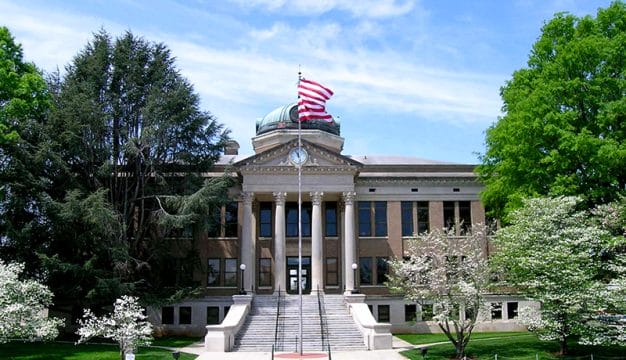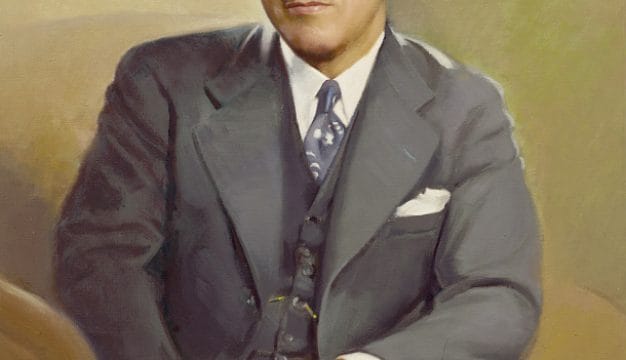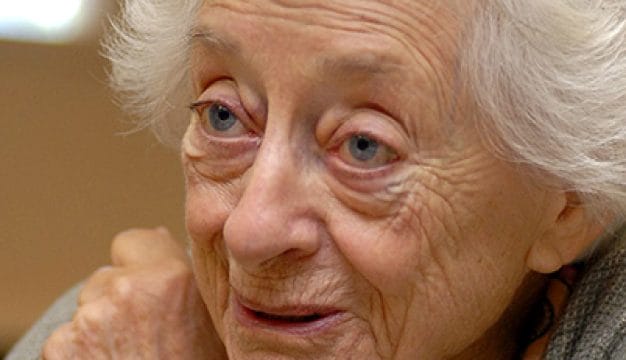Halle Tanner Dillon
Halle Tanner Dillon (1864-1901) was an African American physician who became the first woman certified to practice medicine in Alabama. Dillon was also one of the earliest, if not the first, campus-based doctor in the state, serving for three years as resident physician at Tuskegee Institute (present-day Tuskegee University).
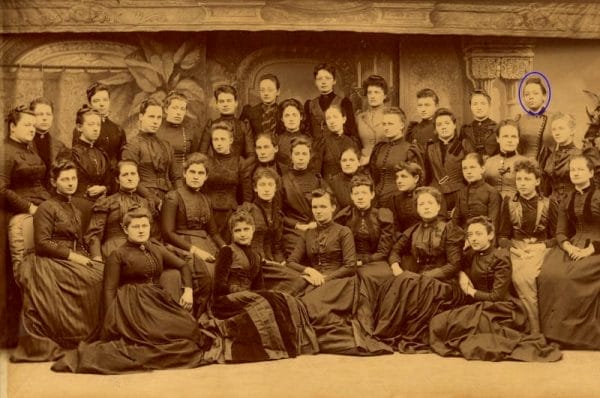 Halle Tanner Dillon, 1891
Halle Tanner was born on October 17, 1864, in Pittsburgh, Pennsylvania, the daughter of Benjamin Tucker Tanner, an African Methodist Episcopal (AME) minister, eventual bishop and editor of church publications, and Sarah Elizabeth Miller Tanner. Halle was the eldest daughter of nine children, two of whom died in infancy. Older brother Henry Ossawa Tanner (1859-1937) became a well-known painter of landscapes and religious subjects. The household was a center of black culture and a haven for prominent guests, including famed abolitionist Frederick Douglass, after the family moved to Philadelphia.
Halle Tanner Dillon, 1891
Halle Tanner was born on October 17, 1864, in Pittsburgh, Pennsylvania, the daughter of Benjamin Tucker Tanner, an African Methodist Episcopal (AME) minister, eventual bishop and editor of church publications, and Sarah Elizabeth Miller Tanner. Halle was the eldest daughter of nine children, two of whom died in infancy. Older brother Henry Ossawa Tanner (1859-1937) became a well-known painter of landscapes and religious subjects. The household was a center of black culture and a haven for prominent guests, including famed abolitionist Frederick Douglass, after the family moved to Philadelphia.
Halle married Charles E. Dillon of Trenton, New Jersey, in June 1886. Daughter Sadie was born the following year. Charles died soon after the birth, and Halle and her child returned home to Philadelphia. At age 24, Dillon entered the Woman’s Medical College of Pennsylvania; she was the only African American in her class of 36 and graduated with honors on May 7, 1891.
Through the college dean, Clara Marshall, Dillon connected with Booker T. Washington, president of the Tuskegee Institute, in Tuskegee, Macon County. He had written a letter to Marshall regarding his need for a physician at the school. Dillon wrote Washington about the position, and he responded with a description and also journeyed to Philadelphia that spring to meet Dillon and her father. Dillon accepted the position and moved to Tuskegee in August. Set to begin working on September 1, 1891, Dillon first had to pass the Alabama certification exam, which consisted of answering hundreds of questions from the all-white board of examiners over several days.
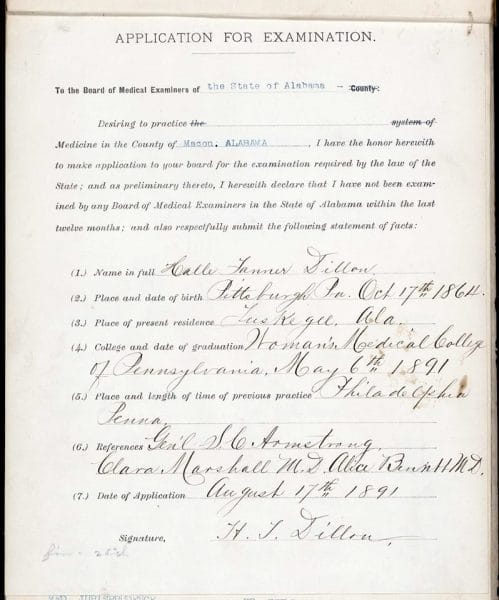 Halle Tanner Dillon Exam Application
Washington, knowing how difficult the exam would be for Dillon arranged for her to study with Montgomery physician Cornelius Nathaniel Dorsette. He was a classmate of Washington’s at Hampton Institute and an 1882 graduate of the University of Buffalo Medical School. Washington had persuaded Dorsette to come south and set up a practice as the first licensed African American physician in Montgomery, Montgomery County, and one of the first in the state. After her period of study with Dorsette, Dillon sat for the medical licensure examination. The test began in Montgomery on August 17, 1891, and concluded on August 25. During those days, she was examined on 10 subjects by 10 different examiners. At that time, anyone wanting to take the state medical certification exam could either take it before any county board or at the state board in Montgomery. Why Dillon took the exam there instead of Macon County is a mystery; Washington had made her aware of the choice. Among her examiners in Montgomery were some of the most prominent physicians in Alabama at the time.
Halle Tanner Dillon Exam Application
Washington, knowing how difficult the exam would be for Dillon arranged for her to study with Montgomery physician Cornelius Nathaniel Dorsette. He was a classmate of Washington’s at Hampton Institute and an 1882 graduate of the University of Buffalo Medical School. Washington had persuaded Dorsette to come south and set up a practice as the first licensed African American physician in Montgomery, Montgomery County, and one of the first in the state. After her period of study with Dorsette, Dillon sat for the medical licensure examination. The test began in Montgomery on August 17, 1891, and concluded on August 25. During those days, she was examined on 10 subjects by 10 different examiners. At that time, anyone wanting to take the state medical certification exam could either take it before any county board or at the state board in Montgomery. Why Dillon took the exam there instead of Macon County is a mystery; Washington had made her aware of the choice. Among her examiners in Montgomery were some of the most prominent physicians in Alabama at the time.
Peter Bryce, superintendent of the Alabama Insane Hospital since 1860, tested her on medical jurisprudence. Jerome Cochran, state health officer and the primary force behind the Medical Licensure Act of 1877, examined Dillon in chemistry. Her examiner in natural history and diagnosis of diseases was George A. Ketchum, Dean of the Medical College of Alabama from 1885 until his death in 1906; he was also involved in creating the Medical Association of the State of Alabama (MASA) in 1847. James T. Searcy, her examiner in hygiene, became superintendent of the Alabama Insane Hospital following Bryce’s death. Dillon was examined in obstetrical operations by John. B. Gaston, who had served as president of MASA in 1882.
Dillon passed the examinations. Early in the process, Walter Bressell, clerk of the Alabama State Board of Health, told her that she had done well in chemistry. That knowledge must have bolstered her confidence. She told Washington in a letter during the exams that she felt she could pass if graded fairly and acknowledged that the surgery portion was very difficult. She so impressed the members of the board that her performance on the examination was noted in the 1892 MASA journal Transactions.
Dillon served at Tuskegee from September 1, 1891, until sometime in 1894. She was paid $600 a year for the position plus room and board and a month vacation. Dillon lived in Alabama Hall on campus. During her years there, she cared for some 450 students as well as 30 faculty and their families. She made her own medicines as much as possible and taught classes as needed. She also had private patients, who were charged 25 cents for medicines and 10 cents for house calls. She founded the Lafayette Dispensary and Nurses Training School on campus, funded by a northern philanthropist, to provide health services for black residents. She described the clinic at a May 1894 meeting of Women’s Medical College of Pennsylvania alumni, noting the “hundreds in need of medical attention” in the area surrounding Tuskegee Institute. In a 1910 article, Booker T. Washington described the thriving nursing school’s three-year program and indicated the existence of a hospital at the Institute.
In 1894, Dillon married John Quincy Johnson, a minister and mathematics teacher at Tuskegee; the couple would have three sons. Whether Halle Tanner Dillon Johnson ceased the practice of medicine after her second marriage is unknown. The following year, Johnson was named president of Allen University in Columbia, South Carolina. In 1900, he became pastor of St. Paul’s AME church in Nashville, Tennessee, and the family moved there. Dillon died on April 26, 1901, of dysentery and childbirth complications at 37. She is buried in Greenwood Cemetery in Nashville.
Dillon’s hand-written medical certification exam is available, along with those of many other individuals from the nineteenth century, at the Alabama Department of Archives and History in Montgomery.
Further Reading
- Blassingame, John W., and Pete Daniel. The Booker T. Washington Papers. Volumes 1-14. Oxford: Oxford University Press, 2005.
- Hine, Darlene. Black Women in America. Oxford: Oxford University Press, 2005.
- Washington, Booker T. “Training Colored Nurses at Tuskegee.” American Journal of Nursing 11 (October 1910): 167-71.
